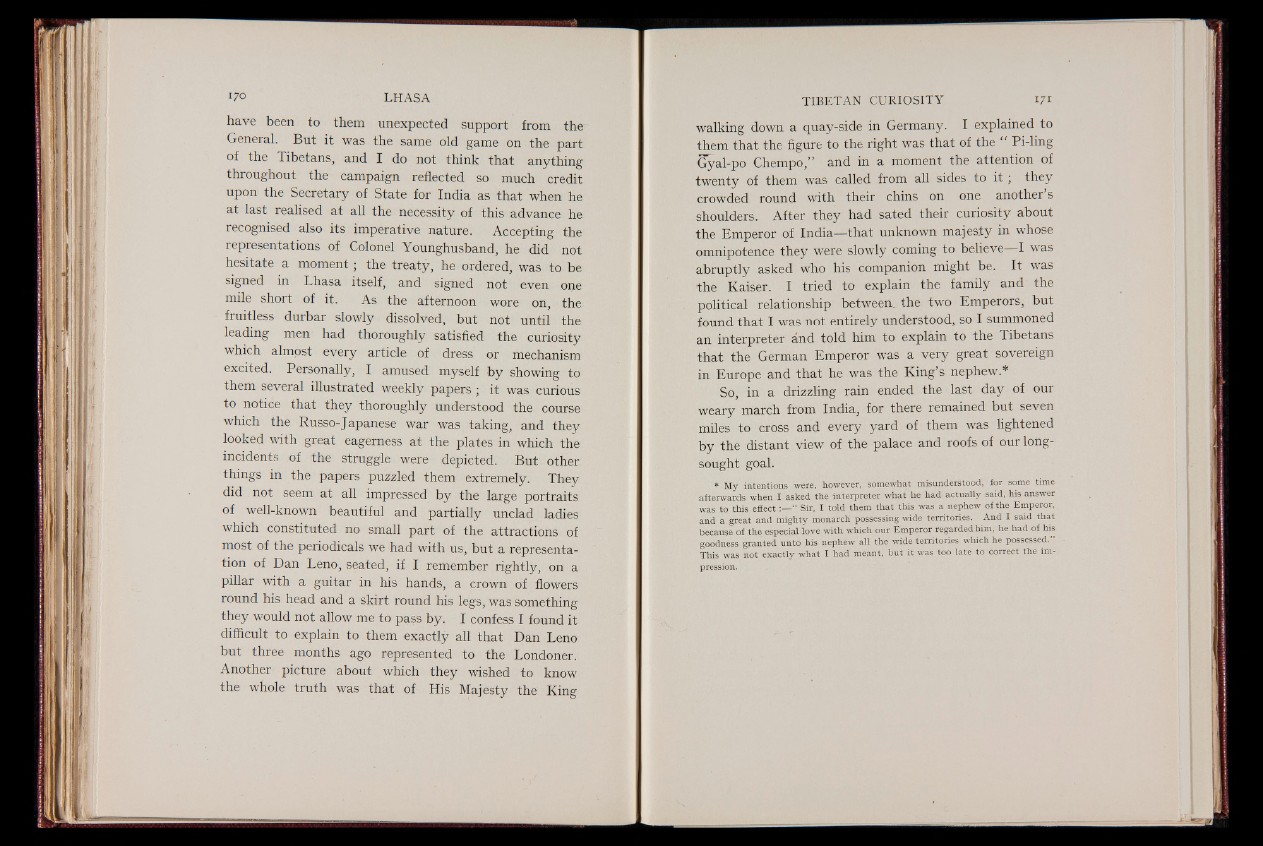
have been to them unexpected support from the
General. But it was the same old game on the part
of the Tibetans, and I do not think that anything
throughout the campaign reflected so much credit
upon the Secretary of State for India as that when he
at last realised at all the necessity of this advance he
recognised also its imperative nature. Accepting the
representations of Colonel Younghusband, he did not
hesitate a moment • the treaty, he ordered, was to be
signed in Lhasa itself, and signed not even one
mile short of it. As the afternoon wore on, the
fruitless durbar slowly dissolved, but not until the
leading men had thoroughly satisfied the curiosity
which almost every article of dress or mechanism
excited. Personally, I amused myself by showing to
them several illustrated weekly papers ; it was curious
to notice that they thoroughly understood the course
which the Russo-Japanese war was taking, and they
looked with great eagerness at the plates in which the
incidents of the struggle were depicted. But other
things in the papers puzzled them extremely. They
did not seem at all impressed by the large portraits
of well-known beautiful and partially unclad ladies
which constituted no small part of the attractions of
most of the periodicals we had with us, but a representation
of Dan Leno, seated, if I remember rightly, on a
pillar with a guitar in his hands, a crown of flowers
round his head and a skirt round his legs, was something
they would not allow me to pass by. I confess I found it
difficult to explain to them exactly all that Dan Leno
but three months ago represented to the Londoner.
Another picture about which they wished to know
the whole truth was that of His Majesty the King
walking down a quay-side in Germany. I explained to
them that the figure to the right was that of the Pi-ling
Gyal-po Chempo,” and in a moment the attention of
twenty of them was called from all sides to i t ; they
crowded round with their chins on one another s
shoulders. After they had sated their curiosity about
the Emperor of India— that unknown majesty in whose
omnipotence they were slowly coming to believe I was
abruptly asked who his companion might be. It was
the Kaiser. I tried to explain the family and the
political relationship between, the two Emperors, but
found that I was not entirely understood, so I summoned
an interpreter and told him to explain to the Tibetans
that the German Emperor was a very great sovereign
in Europe and that he was the King’s nephew.*
So, in a drizzling rain ended the last day of our
weary march from India, for there remained but seven
miles to cross and every yard of them was lightened
by the distant view of the palace and roofs of our long-
sought goal.
* My intentions were, however, somewhat misunderstood, for some time
afterwards when I asked the interpreter what he had actually said, his answer
was to this e f f e c t “ Sir, I told them that this was a nephew of the Emperor,
and a great and mighty monarch possessing wide territories. And I said that
because of the especial love with which our Emperor regarded him, he had of his
goodness granted unto his nephew all the wide territories which he possessed.”
This was not exactly what I had meant, but it was too la t e to correct the impression.